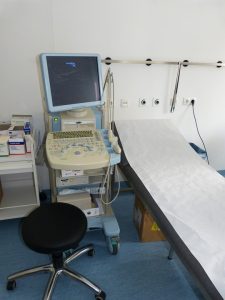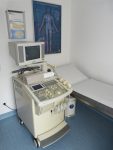
If you are a student looking for a long-term career in healthcare we can suggest that you take a closer look at a fast-growing field of ultrasound training.
Now, one of your first questions about this field can be “What do ultrasound techs actually do?” so we are here to inform you about this as well.
Ultrasound technicians are also known as diagnostic medical technicians or sonographers.
Their job is to use sound wave technology that produces digital images that can help physicians track the development of a fetus, spot tumors or other diseases in the human body, and take a closer look at internal structures and functions like circulation.
Page Navigation
- On The Job Information For Ultrasound Careers
- How Can You Learn More About Sonography Tech Careers?
- What Is Ultrasound Technology?
- What Are Job Duties of a Sonography Technician?
- What Do Ultrasound Technicians Do To Reduce Patient Anxiety?
- How Do Ultrasound Technicians Further Their Education?
- Do I Need To Be Certified To Be An Ultrasound Tech?
- What Types of Sonography Jobs Are There?
- What Do Ultrasound Technicians Do To Prepare For Successful Careers?
- What Other Careers Can Ultrasound Techs Pursue?
- What Does the Future Look Like for Sonography Techs?
- What Are The Most Rewarding Things About Working In Healthcare?
On The Job Information For Ultrasound Careers
Another question that you may ask is: where do sonographers work?
In the majority of cases, ultrasound technicians work in a variety of healthcare facilities, from hospitals to physicians’ offices to mobile laboratories.
These professionals can work full-time and part-time and positions are available in a huge variety of settings.
However, do not expect to have regular working hours, as sonographer’s shifts are never known.
The shifts, as well as the salary, benefits, and job security, will depend on where you work.
But, for many professionals, they make up for any sacrifices they have to make to work in the healthcare industry.
How Can You Learn More About Sonography Tech Careers?
The main aim of this article is to help you understand your options for ultrasound technician training.
Having in mind that we have connections with schools and e-campuses across the nation, we are here to help students meet the training requirements for sonography.
What we also provide you with are tips to help you pass your examinations and register with the American Registry of Diagnostic Medical Sonography (ARDMS).
Once see what options you have in your area for training, your next step should be requesting information so you can compare the programs and make the right choice for you.
What Is Ultrasound Technology?
Let’s first discuss ultrasound technology in general.
The term refers to the use of high-frequency sound waves to capture real-time imagery of the organs, arteries, and other components of the human body.
It is actually connected to a pregnant woman who is looking at the images of her fetus on a screen.
However, ultrasound technology is much more than this.
Sonography techs use a tool called a transducer, that is, a wand-like piece of equipment that emits the sound waves that eventually result in an image on the screen.
An ultrasound tech does this medical intervention that causes no pain, which many find a positive side of this profession.
Ultrasound does not emit radiation or harm the patient in any way, so nowadays, more physicians are replacing old methods, such as some kinds of X-rays with ultrasound technology.
As we have already said, ultrasound technology is not only used to track the development of a pregnancy, but it is beneficial for numerous examinations, including breast exams, abdominal exams, to see how well blood is flowing, and to track blockages in arteries that could lead to death.
What Are Job Duties of a Sonography Technician?
According to the Bureau of Labor Statistics, the daily duties of ultrasound technicians are numerous and various, so we provide you with a summary of what your job duties may consist of once you become a sonographer:
- Prepare patients for the procedures, that is, take a brief medical history, and compile any information that may be relevant to the procedure.
- The possession of a strong understanding of the equipment and tools is obligatory as you will use to execute these procedures. You will be responsible to prepare the equipment for the procedure.
- Ultrasound technicians training has to be extensive and strict so that they can learn how to perform the procedures on their own–without the assistance of a physician or fellow sonographer.
- Once the image is obtained, you will need to conduct the initial analysis of the image to inform the physician of your findings as they will rely on you to give them the best information about the images. That way you will save them time and deliver the best care. In case of emergency, you are responsible for passing this information along quickly.
- Sonographers must understand how to track the findings from the sonograms to make sure their records are organized and easily reviewed by the physician, and answer any questions the patient might have.
What Do Ultrasound Technicians Do To Reduce Patient Anxiety?
The most important characteristics of any sonographer are patience and compassion.
These qualities that you will need to possess would be useful for your communication with patients.
When they come to a hospital, they will feel great anxiety, so it will be your task to hold their hand and put your patient’s anxiety at ease.
So, during your studies, it is our suggestion to pay attention to the lessons from your mentors and teachers in this area of care so as to be successful in this area as well.
How Do Ultrasound Technicians Further Their Education?
Upon graduation, people focus only on finding a satisfactory job, but they need to have in mind that the medical field requires much more than just getting a degree.
Your knowledge has to be constantly advancing and improving, as the development of technology requires.
You should look to join any healthcare professional organization that you can as these organizations are there to keep up with the latest findings and best practices in the field of diagnostic medical sonography and ultrasound technologist skills.
The Society of Diagnostic Medical Sonography (SDMS) is probably the top-recommended organization for the entry-level sonographers.
This is the largest association of medical sonographers in the world, boasting over 27,000 members and offering resources available for professionals, including a job board, lists of clinical standards, guidelines, and other helpful information about ultrasound technician requirements.
Do I Need To Be Certified To Be An Ultrasound Tech?
The answer is yes, as ultrasound technicians should be registered with The American Registry for Diagnostic Medical Sonography, even though in the majority of states it is not obligatory.
The reason why we emphasize the certification through The American Registry for Diagnostic Medical Sonography (ARDMS) is that employers tend to hire people with a license and they get better salaries as well.
To get registered through the official exam agency for the field of sonography, you will need to pass their exams and can become certified in several areas.
First, you can become registered as an RDMS (registered diagnostic medical sonographer) if you pass the SPI (sonography principles and instrumentation examination) exam.
When you pass these exams, you can take the following corresponding specialty examinations: abdomen, breast, fetal echocardiography, obstetrics and gynecology, and pediatric sonography.
Also, you can become RDCS (registered diagnostic cardiac sonographer) registered by passing the SPI exam, plus the following corresponding specialty examinations: adult echocardiography, fetal echocardiography, and pediatric echocardiography.
RVT (registered vascular sonographers) need to pass the SPI exam and can take the vascular technology specialty exam to become certified in that area.
RMSKS (registered musculoskeletal sonographers) needs to pass the SPI exam and can take the musculoskeletal sonographer examination to be certified.
As you can see, sonographers need to do a lot to get to their positions and all these efforts are really worth it.
What Types of Sonography Jobs Are There?
According to the equipment they use professionals who use sonography or ultrasound can be divided into two main categories.
There are distinctions when it comes to the roles for sonography techs within each category.
Our aim is to talk about the types of diagnostic medical sonographer jobs, and then we will also discuss cardiovascular technologists and technician jobs that you can pursue with sonography training.
Diagnostic Medical Sonographers are professionals who specialize in capturing images of organs and body tissue when health problems are being figured out.
The most common medical sonographer specialty areas:
- Abdominal
- Breast
- Musculoskeletal
- Pediatric
- Obstetrics and gynecology
These sonographers can work in various medical offices, physician offices, and laboratories and the help of a trained medical sonographer is priceless.
The second type of sonography career route is specifically in the cardiovascular realm, meaning that they will do images related to the heart and circulation.
There are various types of cardiovascular technologists that use sonography technology, as they can use ultrasound technology to capture images related to the heart, veins, and arteries.
If you are working at a hospital, you might help doctors prepare for open-heart surgery, heart catheterizations, or other types of procedures, which is considered a very responsible duty.
- Cardiac sonographers are ultrasound technologists who focus on the heart chambers, producing ultrasound images called echocardiograms.
- Cardiovascular invasive specialists are professionals who help monitor heart rates and assist with catheterization. These specialists may also help prep patients for heart surgery.
- Vascular sonographers use sonography equipment to capture images of blood vessels, to help doctors understand what is going on with a patient’s blood flow.
What Do Ultrasound Technicians Do To Prepare For Successful Careers?
The education is not short and easy, as many people would expect, as sonography training programs are usually between 1-2 years in length.
There are ultrasound schools that will help you find clinical experiences in several types of work environments, so that students can experience and learn what it is like to work in hospitals, physician’s offices, and other settings that perform sonography work, and would be familiar with their duties once they enter the facility.
When you perform your clinical hours, it is our advice to grasp as much information and knowledge from your peers and physicians as possible as the information you get would be extremely useful for you later on.
Also pay attention to how the office is managed, how sonographers interact with administrative staff and patients, as all these will affect the development of your professional skills and will make you more effective.
You need to remember that the more you get during your studies the more efficient you will be one day when it will just be you in the office, performing the ultrasound techniques that doctors rely on for patient care.
What Other Careers Can Ultrasound Techs Pursue?
Your first step is to meet the ultrasound technician requirements.
Once this level is reached, you can always decide to expand your skillset into new areas.
This may be needed so that you can seek promotions that lead to management positions or you know that having more skills can only make you more attractive to employers and you can negotiate the position and salary.
You might also go from your bachelor’s education to a graduate program that focuses on leadership, being that this type of degree can help you lead organizations and manage workers.
You might also pursue a role in public policy or work for a private company that develops products or services for healthcare customers.
What Does the Future Look Like for Sonography Techs?
If we take a look at the statistics, the USA is a country where the prospects of becoming a sonographer become really exciting.
You will be able to get to work daily to show compassion for others and deliver high-quality care, and you will also enter a field with a strong employment forecast.
The BLS projects large growth for ultrasound technicians job, 26% which is more than enough, being that the current average for occupational growth is 7% for all occupations combined.
The top states for employment of sonographers are California, Florida, New York, Texas, and Pennsylvania and sonographers can notice that the salaries range, but $70,880 is a national average.
What Are The Most Rewarding Things About Working In Healthcare?
If you managed to understand what ultrasound techs do, and you believe that you can manage all these duties, we suggest that you start your journey as a future sonographer.
What we would like to add are different kinds of personal benefits you can receive from sonography careers, as this career is not only about duties.
If you have a natural interest in the sciences, as the courses that you will deal with during your studies are physics, ethics, the human anatomy, and labs so that you can be prepared to perform an assortment of sonography tests, and enjoy working with people, you could make a good ultrasound technician.
What is not taught during the training is empathy and compassion for others and those are qualities you should already possess if you want success in this field.
In case you are compassionate and patient with people in need, you will find ultrasound tech work can be extremely rewarding in this aspect.
There is a theory that compassionate care can deliver better outcomes for patients, and help doctors and nurses perform better in their roles as well.
So, if this career in healthcare sounds like an appealing opportunity for you, now is the right time to take the next step and contact schools that offer training for students in your area and get on this journey towards your new career.








